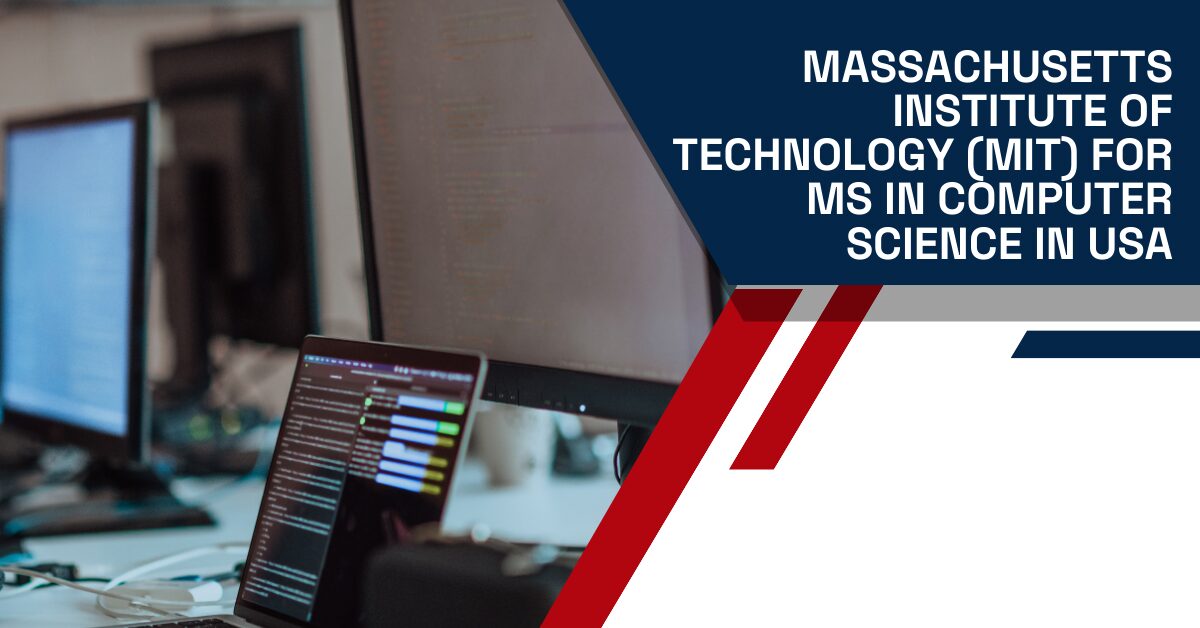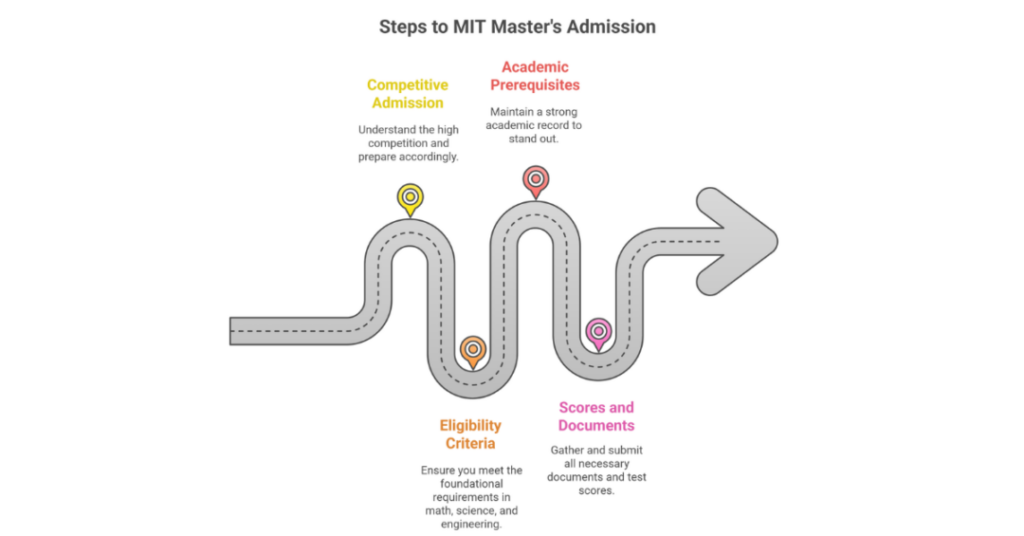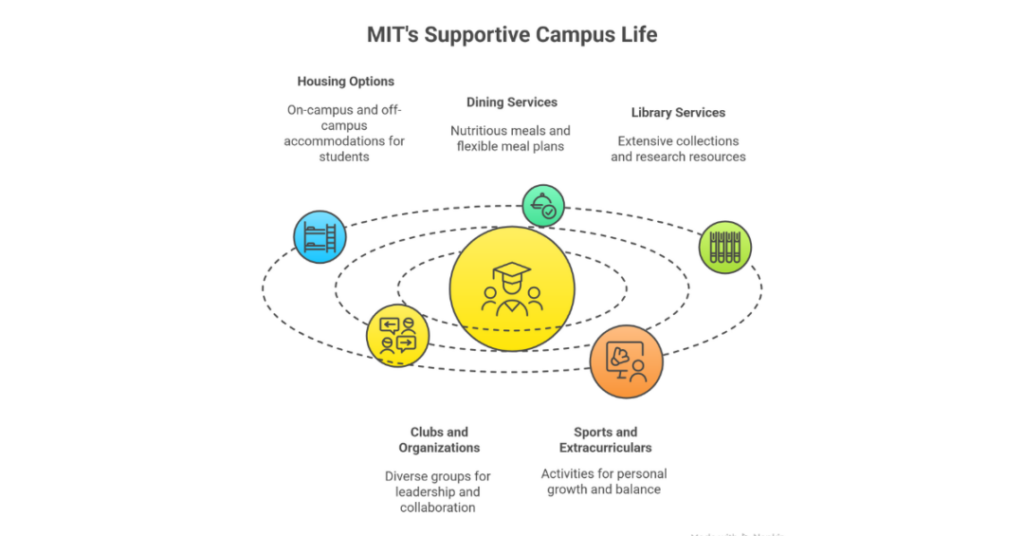24 July 2025
6 minutes read
Massachusetts Institute Of Technology (MIT) For MS In Computer Science In USA

Key Takeaways
- Massachusetts Institute of Technology USA MS in Computer Science offers QS-ranked global recognition, interdisciplinary learning, and strong career prospects.
- Flexible specializations in AI, robotics, and computational science provide hands-on research and industry-driven project experience.
- Graduates secure top jobs and alumni mentorship, ensuring excellent ROI and global career opportunities.
Pursuing a Master of Science in Computer Science (CS) at the Massachusetts Institute of Technology (MIT) is not just an academic decision; it’s a commitment to pushing the frontiers of knowledge and technology. This comprehensive guide will walk you through every aspect of the CS program at MIT, from the curriculum and admissions process to life on campus and career prospects.
Why Choose MS In Computer Science At Massachusetts Institute of Technology?
MIT’s CS program is globally recognized for its rigorous academic curriculum, innovative research opportunities, and its production of industry leaders and pioneers. It’s where the theoretical meets the practical, and where students are prepared to address complex technological challenges.
- Global Recognition: MIT’s CS program is renowned for its rigorous academic curriculum, innovative research, and producing industry leaders.
- Theoretical and Practical Integration: Prepares students to tackle complex technological challenges by blending theoretical knowledge with practical application.
- Significance and Scope: Aims to provide a comprehensive understanding of foundational elements and advancements in electrical engineering and computer science.
- Leadership Focus: Designed for individuals aiming to become leaders in tech innovation, research, and development.
- Hands-On Approach: Encourages the application of classroom concepts to real-world problems, enhancing material understanding and practical skills.
What Is The Admission Process and Entry Requirements For Master’s of Science Program At MIT?
The admission process and entry requirements for a Master’s degree at the Massachusetts Institute of Technology (MIT) are designed to identify and select the most qualified candidates. Applicants must go through a rigorous application procedure that includes submitting transcripts, letters of recommendation, a statement of purpose, and standardized test scores.

MIT seeks students who demonstrate exceptional academic achievement, innovative thinking, and a passion for research and technology. Here’s a breakdown of what you will actually need:
- Competitive Admission: Admission to MIT’s CS program is highly competitive and seeks candidates with preparation and a strong academic background.
- Eligibility Criteria: Applicants typically need a solid foundation in mathematics, science, and engineering, along with a relevant undergraduate degree to please the admissions committee.
- Academic Prerequisites: A strong academic record is crucial for consideration.
- Scores and Documents Required: Prospective students should submit GRE scores, TOEFL scores (for international applicants), transcripts, academic letters of recommendation, a statement of objectives, and a resume/CV.
Master of Science: Costs and Financial Aid
MIT provides an academic achievement financial aid program to help manage the costs of education, ensuring that the brightest minds can attend, irrespective of their financial circumstances.
| Category | Description |
|---|---|
| Tuition Fees (2024) | Includes the cost of all academic instruction. |
| Living Expenses | Estimates for housing, food, and personal expenses. |
| Health Insurance | Mandatory health insurance fees unless proof of equivalent coverage is provided. |
| Other Fees | Includes activity fees, technology fees, and other miscellaneous costs. |
| Financial Aid Options | Need-based Aid: Grants and scholarships based on financial need. Fellowships: Merit-based awards for academic excellence. Assistantships: Work-study positions, usually in teaching or research. |
| External Scholarships | Information on scholarships from organizations outside MIT. Available to various student groups based on criteria like merit, need, etc. |
Course Curriculum and Specializations
The course curriculum and specializations for a Master’s degree at MIT are designed to provide students with a comprehensive and in-depth education in their chosen field. MIT offers a wide range of specializations, allowing students to tailor their studies to their specific interests and career goals.
| Component | Description |
|---|---|
| Core Modules | Fundamental courses all students must take, covering key concepts in electrical engineering programs and computer science. |
| Elective Options | A diverse selection of courses allows students to specialize in areas of interest within the EECS field. |
| Specialization Areas | Potential focus areas include Artificial Intelligence, Robotics, Systems Engineering, and more. |
| Research Opportunities | Opportunities to work on cutting-edge projects in labs and research centers across MIT. |
| Project Work | Hands-on projects where students apply learned concepts to real-world scenarios, often culminating in a thesis or presentation. |
How Is The Campus Life and Student Resources?
Campus life and student resources at the Massachusetts Institute of Technology (MIT) create a dynamic and supportive setting for graduate students, including those pursuing a Master of Science in Computer Science (MS in Computer Science).
Ranked among top universities in global university rankings like QS World University Rankings, MIT offers exceptional academic programs, research centers, and extracurricular opportunities for students with a strong background in computer science and related fields.

Here’s how campus life supports students pursuing degrees like the MIT CCSE or interdisciplinary computational science programs:
Housing Options
MIT offers on-campus dormitories and apartments for graduate students, undergraduates, and international applicants, including those in the SM program or computational science programs. Students pursuing an MS degree or doctoral studies in EECS can also explore off-campus accommodations if preferred. Housing decisions regarding placement take into consideration student needs and course fees.
Dining Services
MIT provides dining halls and cafes across the institute, offering nutritious meals for undergraduates and graduate students, including those enrolled in programs in computer science or interdisciplinary computational approaches. Students are allowed to choose meal plans that support their busy schedules, whether focused on coursework or research opportunities.
Library Services
The libraries comprise extensive collections, databases, and research and education resources supporting academic programs like the master’s in computer science, computational science, and computer engineering. Graduate students and undergraduates can access research centers, numerical simulation tools, and optimization-related materials for their coursework and research work.
Clubs and Organizations
MIT offers over 500 clubs and organizations across the institute, including groups related to computer science, nanotechnology, and interdisciplinary program areas like linguistics and computational approaches. Students who are interested in leadership or research opportunities can join societies that enhance their CV, academic performance, and research collaborations.
Sports Teams and Extracurricular Activities
MIT’s athletics and extracurriculars encourage a balanced life for students pursuing academic programs like the CSE SM, EECS, or degree in computational science. Students are allowed to participate in recreational teams, arts, volunteer work, and leadership programs to optimize personal growth and complement their research and education journey.
Career Opportunities and Alumni Network
MIT graduates are sought after by top employers worldwide, thanks to their rigorous training and innovative mindset. The Institute’s strong emphasis on research and practical experience ensures that students are well-prepared for a variety of career paths, from academia to industry. Here are some available career options which are highly lucrative:
| Career Path | Description | Typical Employers | Skills Utilized |
|---|---|---|---|
| Software Engineer | Develop and maintain software systems that meet client needs. | Tech companies, Startups, Multinationals | Programming, problem-solving, system design |
| Data Scientist | Use statistical methods to analyze and interpret complex data to aid decision-making. | Finance, Healthcare, Retail, Tech | Statistical analysis, machine learning, data visualization |
| Systems Analyst | Design and implement efficient IT solutions to meet business needs. | IT firms, Consultancies, Large Corporates | Systems evaluation, integration, user interaction |
| Research Scientist | Conduct research in various fields of computer science and electrical engineering. | Universities, Research Labs | Experimental design, data analysis, technical writing |
| Hardware Engineer | Design and develop computer hardware and components. | Computer manufacturers, Aerospace companies | Circuit design, testing, manufacturing know-how |
| Network Architect | Design and build data communication networks, including local area networks (LANs) and larger networks. | Telecoms, IT services, Large Corporates | Network design, troubleshooting, security |
| Robotics Engineer | Design and develop robotic systems and applications. | Manufacturing, Healthcare, Defense | Mechanics, electronics, programming |
| AI Specialist | Work on improving and innovating artificial intelligence technologies. | Tech firms, AI startups, Research institutions | Machine learning, programming, cognitive science knowledge |
| Cybersecurity Analyst | Protect systems against cyber threats and vulnerabilities. | Government, Financial Services, Corporates | Security systems, risk assessment, ethical hacking |
| Project Manager | Oversee technical projects ensuring they are completed on time and within budget. | Almost all industries | Leadership, planning, communication |
| Entrepreneur/Startup Founder | Create and grow new business ventures, often in technology or engineering fields. | Self-employed | Innovation, risk-taking, business acumen |
| Consultant | Provide expert advice and strategies for technology and business improvement. | Consulting firms, Independent practice | Problem-solving, industry knowledge, communication |
Conclusion
At last, it is not just about the degree; it’s about joining a community that’s at the forefront of technological innovation. The program is designed to push boundaries, offering a blend of rigorous coursework and hands-on research. You’ll be working alongside some of the brightest minds in the field, and the collaborative culture means you’re always learning, both inside and outside the classroom.
One of the standout aspects of MIT’s EECS program is its flexibility. Whether you’re passionate about AI, robotics, systems engineering, or another specialization, you can tailor your studies to match your interests and career aspirations. The opportunities for real-world application through projects and research are unparalleled, giving you a chance to make tangible contributions even before you graduate.
Begin your journey to studying in the USA, the land of diverse educational opportunities, with Ambitio. Our platform provides you with the tools and insights to navigate the vast landscape of American universities, helping you find the perfect institution that aligns with your academic goals and aspirations.
FAQs
What are the prerequisites for applying to the MIT EECS Master’s program?
Applicants typically need a strong foundation in mathematics, science, and engineering, along with a relevant undergraduate degree. GRE scores, TOEFL scores (for international applicants), transcripts, letters of recommendation, a statement of objectives, and a resume/CV are usually required.
How competitive is admission to the MIT EECS Master’s program?
Admission is highly competitive, reflecting MIT’s reputation for excellence. The admissions committee looks for candidates with strong academic records, relevant experience, and a demonstrated passion for electrical engineering and computer science.
Are there financial aid and scholarship options available for the EECS Master’s program at MIT?
Yes, MIT offers need-based financial aid, fellowships, and assistantships to help students fund their education. Additionally, there are numerous external scholarships available for which students can apply.
What type of career can I expect after completing the EECS Master’s program at MIT?
Graduates often pursue careers as software engineers, data scientists, research scientists, hardware engineers, and more, working for tech companies, startups, research institutions, and multinational corporations. The program is known for its strong placement rates and industry connections.
What opportunities are available for research and specialization within the EECS program?
The program offers a wide range of elective courses allowing students to specialize in areas of interest within the EECS field. Additionally, MIT’s state-of-the-art research facilities provide ample opportunities for students to engage in cutting-edge research alongside leading researchers.

You can study at top universities worldwide!
Get expert tips and tricks to get into top universities with a free expert session.
Book Your Free 30-Minute Session Now! Book a call now




























